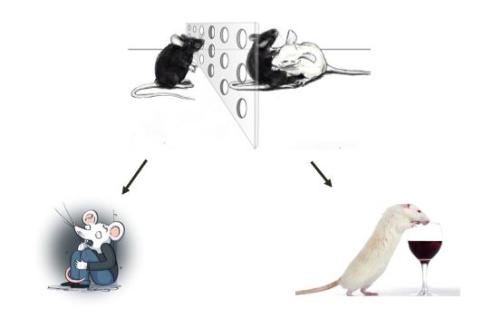Background
Alcohol use disorders (AUDs) are usually comorbid with other psychiatric disorders in humans. Above all, patients diagnosed with AUDs are more likely to develop anxiety disorders during lifetime than non dependent people. Despite the evidence for neurological overlaps between the two disorders, molecular mechanisms are still not fully understood. Moreover, sex-specific effects of stress over the pathophysiology of these disorders are understudied due to scarcity of valid animal models.
My project consisted of two main experiments.

Experiment 1
In the first experiment, I looked at the specific effects of a gene, Prdm2, encoding for a histone methyltransferase enzyme, in fear behaviour, as a of model posttraumatic stress disorder, one of the most prevalent anxiety disorders. This gene was found to be downregulated in the medial prefrontal cortex of alcohol dependent rats.
AIM
For this study, I wanted to test whether a gene involved in the escalation of alcohol use disorders, might also affect fear-related and anxiety-like behaviour. This will consolidate the presence of overlapping molecular mechanisms mediating the pathophysiology of both AUDs and anxiety disorders.
Experiment 2
In a second experiment, I tried to develop a new behavioural model to study sex-specific effects of social stressors in AUDs and anxiety disorders. Social stressors have got special interest in the field because they represent most of the stressors humans are exposed during their lifetime. Evidence shows that social stress can both escalate alcohol use and cause uncontrollable levels of anxiety. Not only experiencing traumatic events, but also witnessing somebody else's trauma can increase the risks to develop psychiatric disorders.
To model this condition in rodents, researchers mostly use social defeat stress, in which one individual is forced to witness an intruder conspecific exposed to repeated attacks of a bigger residient. Both witnesses and stressed animals show higher levels of anxiety and increased levels of alcohol consumption in operant self-administration (Fig. 1). However, this model is not sensitive to sex differences because it is based on intermale aggression. For this reason, in our model, I used inescapable foot shocks as stressors, as they are sensitive to sex differences.
AIM
The aim of this study was to test whether witnessing another individual exposed to inescapable foot shocks could increase anxiety-like behaviour in rats. This will empower the research with a potential model to study sex-specific effects of social stress in psychiatric disorders.

Responsible for this page:
Director of undergraduate studies Biology
Last updated:
